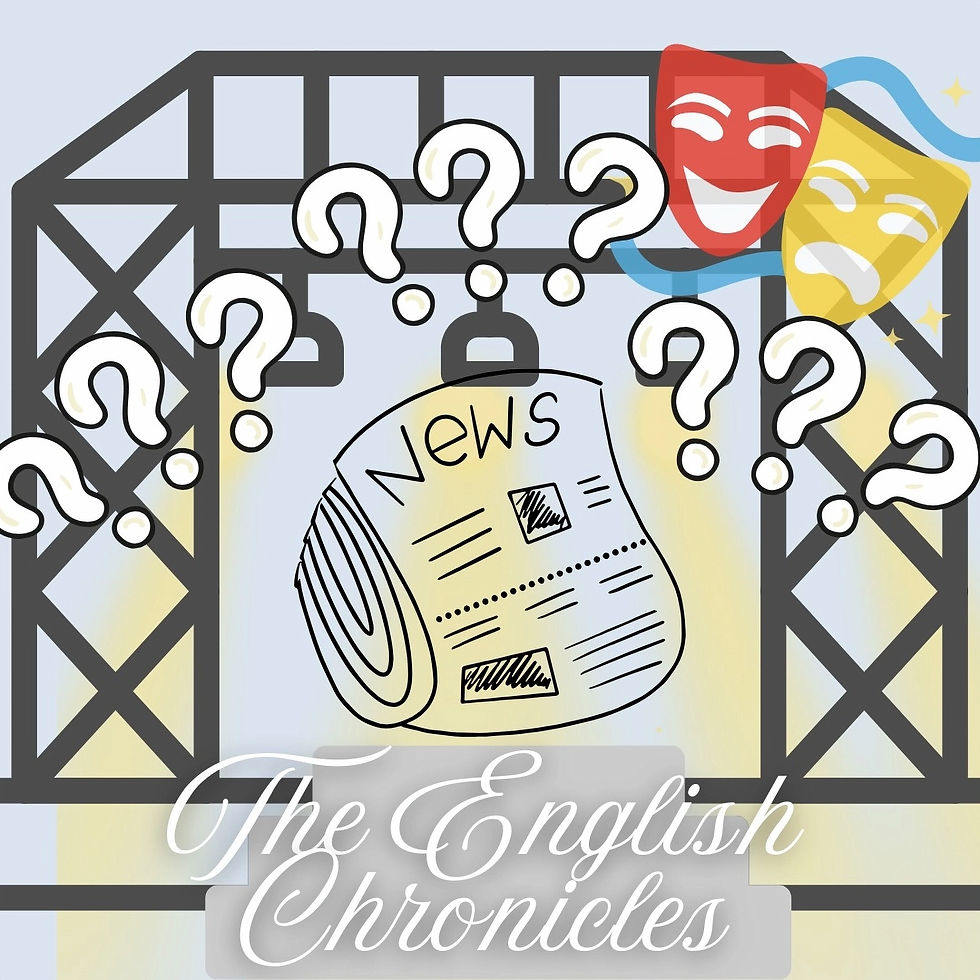🎭 The English Chronicles – Special Feature: The Press Reviews Are In! The question tags start flying!
- sjhanks6
- 19 mars 2025
- 2 min de lecture
The stage lights fade, the audience erupts in applause, and the cast takes their final bow. The next morning, the press is buzzing—every critic has an opinion. Some are certain, others seek confirmation. Welcome to the world of question tags!

👤 Professor Pronunciation:"After every great performance, there are reviews, aren’t there? Some critics are sure of what they say, while others seek agreement. That’s exactly how question tags work in English!"
🎬 Scene 1: What Are Question Tags?
Question tags are short questions added to the end of a sentence. They’re used to:
✔ Confirm information ("The show was incredible, wasn’t it?")
✔ Ask for agreement ("She performed beautifully, didn’t she?")
✔ Express surprise or doubt ("He didn’t forget his lines, did he?")
📌 French speakers, attention! 🚨Unlike in French (n’est-ce pas ?), question tags change depending on the verb—and that’s where it gets tricky!
🎭 Scene 2: The Reviewers – How Question Tags Work
🎙️ The Confident Critic – Positive + Negative Tag
✔ "The performance was brilliant, wasn’t it?" (Confirms a fact)
✔ "She’s a talented actress, isn’t she?" (Seeks agreement)
🗞️ The Skeptical Reviewer – Negative + Positive Tag
✔ "They didn’t rehearse enough, did they?" (Doubts a statement)
✔ "He wasn’t very expressive, was he?" (Challenges an opinion)
📌 Rule:
If the statement is positive, the tag is negative.
If the statement is negative, the tag is positive.
🎤 Scene 3: The Tricky Parts – Exceptions & Special Cases
📌 1️⃣ "I am" becomes "aren’t I" (not "amn't I")
❌ "I’m the best actor, amn’t I?" (Incorrect ❌)
✅ "I’m the best actor, aren’t I?" (Correct ✅)
📌 2️⃣ Modals & Question Tags✔ "She can dance well, can’t she?"✔ "You should try acting, shouldn’t you?"✔ "We must rehearse, mustn’t we?"
📌 3️⃣ Intonation – Does It Sound Like a Real Question?
🎭 Falling intonation (↓) = You expect agreement ("The play was wonderful, wasn’t it? ↓")
🎭 Rising intonation (↑) = You’re really asking ("She didn’t forget her lines, did she? ↑")
🎭 Scene 4: The Critics’ Challenge – Practice Time!
📌 Complete these press reviews using question tags:
1️⃣ The costumes were stunning, __________?
2️⃣ He didn’t miss a single line, __________?
3️⃣ The director knows what she’s doing, __________?
4️⃣ They won’t cancel tomorrow’s rehearsal, __________?
5️⃣ We’ve all enjoyed the show, __________?
💬 Drop your answers in the comments! Let’s see who gets a 5-star review! ⭐⭐⭐⭐⭐
📩 Want more interactive grammar lessons? Subscribe to The Grammar Chronicles!




Want to know more about my teaching methods? Contact me vie the website and you will be invited to a free consultation. See you soon 😀